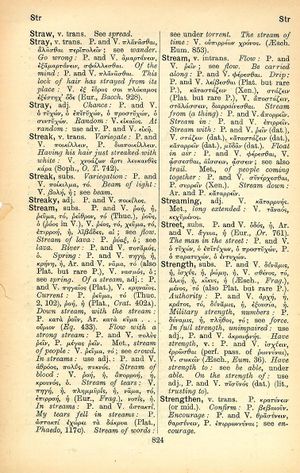strength: Difference between revisions
αἰὼν παῖς ἐστι παίζων, πεσσεύων∙ παιδός η βασιληίη → time is a child playing draughts; the kingship is a child's | a life-time is a child playing, playing checkers: the kingship belongs to a child | a whole human life-time is nothing but a child playing, playing checkers: the kingship belongs to a child | lifetime is a child at play, moving pieces in a game; kingship belongs to the child
m (Woodhouse1 replacement) |
mNo edit summary |
||
| Line 15: | Line 15: | ||
[[have strength to]]: see [[be able]], under [[able]]. | [[have strength to]]: see [[be able]], under [[able]]. | ||
[[on the strength of]]: use adj., [[prose|P.]] and [[verse|V.]] [[ | [[on the strength of]]: use adj., [[prose|P.]] and [[verse|V.]] [[πίσυνος]]; (dat.) (lit., [[trust]]ing to). | ||
}} | }} | ||
Revision as of 07:50, 21 June 2020
English > Greek (Woodhouse)
substantive
P. and V. δύναμις, ἡ, ἰσχύς, ἡ, ῥώμη, ἡ, V. σθένος, τό, ἀλκή, ἡ, κῖκυς, ἡ (Aesch., Fragment), μένος, τό (also Plato but rare P.).
authority: P. and V. ἀρχή, ἡ, κράτος, τό, δύναμις, ἡ, ἐξουσία, ἡ.
military strength, numbers: P. δύναμις, ἡ, πλῆθος, τό; see force.
in full strength, unimpaired: use adj., P. and V. ἀκραιφνής.
have strength, v.: P. and V. ἰσχύειν, ἐρρῶσθαι (perf. pass. of ῥωννύναι), V. σωκεῖν (Aesch., Eum. 36).
have strength to: see be able, under able.
on the strength of: use adj., P. and V. πίσυνος; (dat.) (lit., trusting to).

